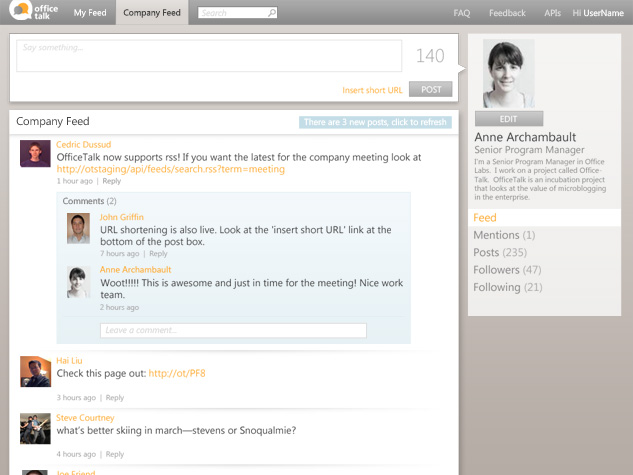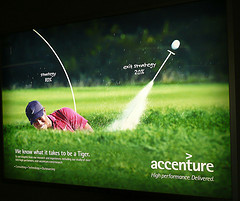Microsoft and Microblogging
This week Microsoft announced what they call a 'concept test' of an enterprise microblogging service that they call OfficeTalk. In this concept test, Microsoft invites a limited number of organizations to participate in testing, and to work with Microsoft to provide recommendations and feedback.
OfficeTalk is a product that has been in internal pilot at Microsoft and is developed by OfficeLabs, the Microsoft lab for testing internally developed ideas. OfficeLabs asks participants to view these experiments as 'Concept Cars', not necessarily intended or promised to become 'real' products, but ones that certainly offer a glimpse at what the massive organization is experimenting with, and potentially might one day market, or as in the case of OfficeTalk incorporate into existing products and platforms.
Microsoft did share a few screen captures of OfficeTalk, the basic features will certainly be familiar to anyone that has used Twitter, or Yammer, the most popular microblogging service designed for internal corporate use.

OfficeTalk users create personal profiles, 'follow' other users, and the Twitter conventions of mentions and tags seem to be present as well. Microsoft has also built in the ability to see threaded conversations and to shorten URLs in updates.
On the surface the features of OfficeTalk are entirely familiar, and even a bit pedestrian. Yammer and other similar services like Socialcast and Obayoo have been out for quite some time now offering all of these features and more.
But none of the existing players in enterprise microblogging can compare to the reach, familiarity, and development muscle of Microsoft. One can easily see the potential for Microsoft to integrate OfficeTalk into Sharepoint, Outlook, or Office, and almost immediately become the dominant player in the still very new market for enterprise microblogging.
Whether or not Microsoft actively pursues this market, and eventually releases OfficeTalk remains to be seen, but I think the ability for the service to one day integrate with the existing installed base of MS Office, and to also be installed on-premise (still important to many IT shops), could position this kind of service as a significant and viable competitor in the enterprise microblogging space.
Just like SAP, which is also experimenting with new forms of collaboration capabilities, (see it's recently renamed StreamWork application), Microsoft may be late to the enterprise microblogging and collaboration party, but it probably should not yet be entirely dismissed as having missed its chance to join the fun.

 Steve
Steve

